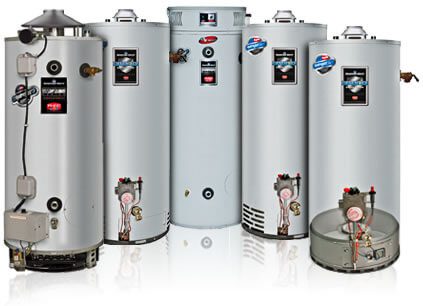We know how frustrating it can be to take a cold shower! There are a number of reasons why you could lose hot water. Let’s discuss the basics of how a hot water heater works and then the possible causes of problems and how we can help!
Water Heater Basics

A water heater is comprised of three basic parts.
- A tank used to house the water and other components
- A thermostat
- A pair of heating elements – top and bottom
Since anything hot rises, cold water is fed under pressure into the bottom of the tank. The thermostat takes periodic readings of the temperature of the water in the tank and based on those readings turns on the elements. When you turn on the hot side of a fixture, it allows water to flow out of the heater and for new, cold, water to flow into the bottom of the tank.
Little or No Hot Water
If any of these components fail, you can suffer from little or no hot water. If the thermostat malfunctions it can cause the heating elements to overrun and burn out. It may also not turn the heating elements on frequently enough and your water may be lukewarm or you run out quickly.
If either of the heating elements fails, you will have little to no hot water. If the bottom element fails, you will most likely notice hot water which quickly runs out. If the top element fails, you will notice lukewarm water. If both fail you have no hot water.
If you have any of these symptoms, contact an expert and we can get someone out to fix your problem today!
Water Tank Leaking
If you notice water pooling around your water heater you have a leak. Due to the number of pipes and fittings on or near the water heater, normally it is necessary for one of our professional technicians to come out and determine the location of the leak.
Leak NEAR the Water Heater
If the leak is near the water heater (a pipe or fitting) and not the heater itself (a hole in the tank) we can repair the pipe and you can continue to use the water heater.
Leak IN the Water Heater
If the water heater leak is originating in the water heater, the water heater will probably need to be replaced. Water heaters are pressurized vessels and not prone to easy repair. It is almost always more cost effective to replace your leaking water heater with a new water heater that carries a warranty and has a better energy efficiency rating.
If you are noticing water leaking anywhere near your tank, take the following steps:
- Disconnect the power source: Pull the plug, shut off the fuel valve or flip the circuit breaker.
- Turn off the water supply: Turn off the main valve outside and the valve on top of the heater.
- Contact the Experts! – E-Schedule online or call the Experts:
Palm Beach County
561-279-2460
Broward County
954-786-0477
…and one of our highly trained technicians will be able to get your problem fixed right away!
Don’t forget, your satisfaction is guaranteed!
Interested in Tankless?
Tankless heaters can provide many advantages over conventional tank water heaters. They conserve space and use less energy since they only require heat when there is water demand. However, they have disadvantages as well. They require a natural gas or liquid propane fuel line to the unit to power it. If this is not available, they can be run off electricity; however most homes in south Florida do not have the proper amperage to run a properly sized tankless heater. This can be overcome by having a new electrical circuit installed.
Contact an Expert now and one of our experts can provide you with more information about your options!

